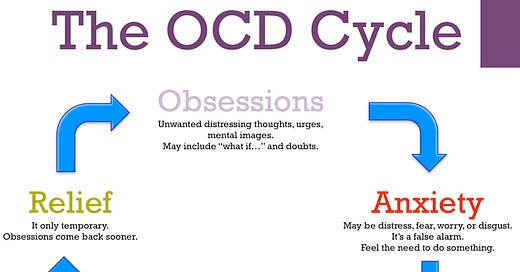Christianity & Obsessive Compulsive Disorder (Part 1)
A Christian Pastor shares his journey with OCD.
A couple weeks ago a prominent pastor stated that “there is no such thing as OCD”, referring to Obsessive-Compulsive Disorder.1
OCD is a mental health disorder which causes individuals to get caught in cycles of obsessions and compulsions. Obsessions are unwanted thoughts, doubts, images, or urges that trigger intensely distressing feelings. Compulsions are behaviors sufferers engage in to attempt to get rid of the obsessions.2
Contrary to popular opinion, OCD is not a preoccupation with neatness or cleanliness.
OCD sufferers do not enjoy their condition or the compulsions they engage. Also, there is a big difference between how our culture understands “being obsessed” with actual obsessions.
An obsession is an intense persistent preoccupation with an unreasonable idea or feeling.3 As such, obsessions are not enjoyable. When somebody says, “I’m obsessed with something”, what they really mean is that they enjoy doing something.
But there is no joy to be found in Obsessive-Compulsive Disorder.
I’m a Christian Pastor who suffers from OCD. I have lived with OCD for over 20 years. It took me 18 years to discover what my condition was and get the help I needed. When I hear Christians disregard or downplay mental illness, I typically roll my eyes and move on.
But not this time.
My desire for this series is to spread greater awareness of this condition, give assurance to those Christians who feel like they are suffering alone, and provide hope for the hopeless.
OCD can be difficult to understand. So, I would like to start by sharing a bit of my own journey. And for that, let’s rewind back to the fall of 1999.
A pocketknife sat between my father and I as we traveled down Interstate 55.
This commute was becoming a frequent one. My parents had purchased land 20 miles outside the city, and my father and I were headed there, once again, to level out the land. Dad would attach a large steel beam to the hitch of his old Chevy, and we would take turns driving slowly over the property, leveling the hills as best we could.
Most teenagers would consider this a dream. But any excitement I had about learning to drive was overshadowed by an impending sense of doom. I couldn’t explain it. There were no words in my vocabulary to explain what I was experiencing. Every time we drove out to the property, I felt overwhelmed by feelings of danger, sorrow, and fear.
I know now that those feelings weren’t tethered to the land. They originated when my brothers and I began changing schools, in preparation for the move. We would change schools four times over the next three years due to school district requirements.
I hated the constant change. Changing homes, schools, churches…the stability of my childhood felt like a thing of the past. The familiar was constantly being replaced by the unfamiliar, and I did not like it. Life as a pre-teen was awkward enough without constantly adjusting to new people and new places while losing old friends.
What if I took the knife and stabbed my dad?
The thought popped into my head like an armed robber. The image of me plunging the knife into my dad’s chest painted itself in my brain.
The blood in my body turned ice cold. My heart rate increased, pounding so hard I could hear it in my ears. I fell deeper into my seat, hunched over, thoughts racing:
why did I have that thought? I love my dad!
What is wrong with me? Normal people don’t have thoughts like this.
I would never do such a thing…or would I? How can I be sure?
What if I go crazy and murder someone I love?
The next twenty minutes were agonizing as I tried to keep my head down and not look at my father or the knife, as if connecting the two would bring about the unthinkable. The next twenty minutes would become indicative of the battle I would face for the next twenty years, a war within myself. A war within my mind.
That evening I committed myself to prayer. I began constructing long, elaborate, prayers of supplication to keep the murderous thoughts and images at bay. Prayer was not unnatural to me. I was a Christian raised in a Christian home, but from that evening on prayer became a means to a very specific end: suppressing unwanted thoughts and images.
I would pray for hours and repeat certain words and sentences until they felt “just right”. Only until I gained those feelings of safety was I permitted to sleep.
For example, I would conclude prayers by reciting:
“In the name of Jesus Christ, the Son of God, my Savior and Lord. Amen.”
Then
“In the name of Jesus Christ, my Savior and Lord, the Son of God. Amen.”
Then
“In the name of Jesus Christ, the Son of God, my Savior, and Lord. Amen.”
If, at any point, I mispronounced a word or went out of order, I would start over again. Such was the punishment for imperfection. But it did not matter, those prayer rituals helped keep the unthinkable from happening-or so I believed. So, it was worth it. It didn’t matter how late I stayed awake staring at the ceiling, as long as my family and friends were safe.
The prayer rituals worked for a season, providing daytime relief from unwanted thoughts and feelings. Until they stopped. The intrusive thoughts began reproducing into even greater unwanted monsters: What if I kill somebody else? What if I kill myself? What if I’m gay? What if I’m a pedophile? What if I’m going crazy?
The thought monsters began feeding off the news and media. Stories of mass shootings, hunting accidents, and suicide threw me into a tailspin. Psychological and horror films would give my mind new content to worry about.
I was forced to develop new elaborate rituals to keep the thoughts and feelings at bay. I began counting my steps throughout the day, ending every footfall with an even number before entering a threshold. Odd numbers I believed unlucky and were consequently avoided.
Mom caught me a few times shuffling my feet quickly before entering the house.
Why do you do that? She asked.
I refused to tell her. I would play it off as a joke or pretend that she had not seen anything.
I remember receiving my first basketball jersey with the number 4. For some reason my mind latched on to that number. Four became my safety number. I began touching and tapping things four times before moving on. I wouldn’t feel safe unless I had done so. If I wanted to be sure that I unplugged the iron, I needed to check four times. If I left my bedroom, I needed to touch the light switch four times, ensuring that it was turned off. If I touched something with my left hand, which, like odd numbers, I considered to be unlucky, it needed to “corrected” by touching it with my right hand…four times.
I would avoid certain numbers and colors: 6=the devil, 13=bad/unlucky, 19=Stephen King, red =murder, pink=gay, blue=depression, etc. I refused to listen to Nirvana even though I really liked their music, because I feared I would end up like Kurt Cobain. Even though I grew up in the south I would avoid wearing camouflage because it was associated with hunting, and hunting was not something I would risk doing. The thought of being alone with a loved one and a gun was unbearable.
In addition to the unwanted thoughts and compulsions, I was unhappy with my physical appearance. I felt ugly. I began noticing imperfections in my face, especially my eyes and nose. I despaired over it’s shape and would smooth out my skin in order to “correct” my appearance. I would conceal my eyes with long hair and hair gel.
My teenage years felt like a fog, both literally and figuratively. The strange thoughts and feelings consumed my life, and I felt like I was living life outside of my own body. Some days I felt totally disconnected from my surroundings, always in my mind, walking around in a haze of fear and hopelessness. I secretly believed that I had only a few years to live. I remember loathing my High School graduation because I believed that it was only a matter of time until my condition was discovered, and I was either locked away, put to death, or lost my mind.
Despite every obstacle I managed to have an enjoyable adolescence. Even with my unknown condition I was able to excel in school, sports, and work. I graduated near the top of my class and went to college on a decent scholarship. I met the love of my life in high school, and we’ve been together now for nearly 20 years.
But I told no one of my condition. Mostly because I wasn’t aware of what I was experiencing. I simply chalked the unwanted thoughts and feelings up to some physical defect, a defect that would eventually make itself known. In fact, I remember hoping my primary care physician would find something physically wrong with me, so I could finally put a name to my condition.
Thankfully, I now know it’s name.
I’m now 35. I’m happily married with three kids and I pastor a lovely church in rural Missouri. Four years ago I finally received the diagnosis: obsessive-compulsive disorder. I’m no longer in the dark.
(Part 2 coming out soon)
https://www.christianpost.com/news/john-macarthur-criticized-for-claiming-mental-illness-isnt-real.html
https://iocdf.org/about-ocd/
https://www.merriam-webster.com/dictionary/obsession




